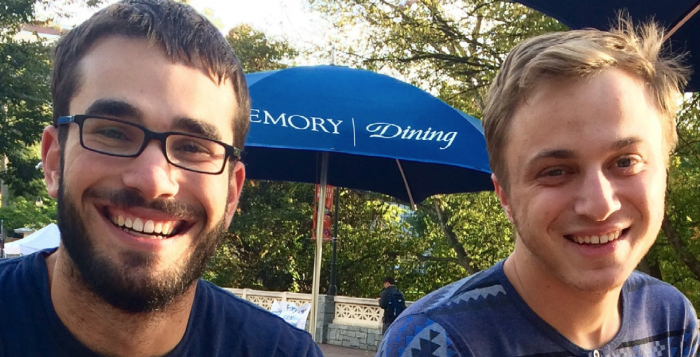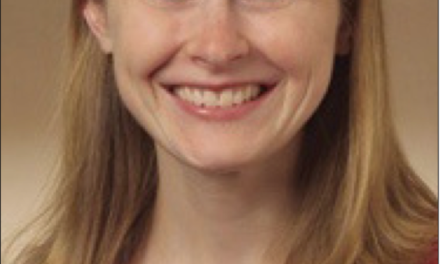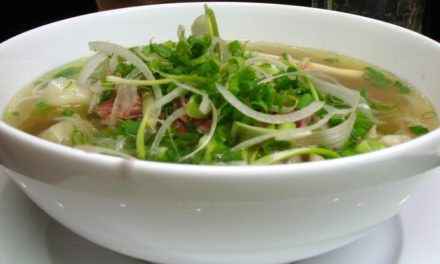
B-School junior Adam Goldstein (left) and College junior Ami Field-Meyer (right) founded TableTalk as a way to encourage cross-cultural dialogue.|Photo by Elyssa Brezel.
By Elyssa Brezel
Contributing Writer
Contributing writer Elyssa Brezel met with juniors Adam Goldstein and Ami Fields-Meyer, the co- founders of one of Emory’s newest initiatives, TableTalk. According to the TableTalk website, the initiative serves as a “framework for conver- sation between people who would not interact under ordinary circum- stances.” Brezel learned the scoop on the initiative to get the conversation going, from the tables at the DUC to the couches on the Quad.
EB: Tell us about yourselves.
Adam Goldstein: I’m Adam Goldstein, a junior from outside Boston. I’m studying American history and business.
Ami Fields-Meyer: I’m Ami Fields-Meyer, also a junior. I’m from L.A, also studying American history. Not business, though – Adam will probably employ me one day.
EB: Where did the idea for TableTalk come from?
AG: I was sitting in my Community Building and Social Change course last fall and I heard a metaphor about “bringing everyone to the table.” Essentially, it means that we will reach a great potential and see the best benefits when we bring together great minds.
I thought about this for a while, and when I was sitting with Ami before December break, he mentioned that we were almost halfway done with our Emory career. What were leaving behind? I finally mentioned my idea of placing a table on campus for minds to connect with others.
AFM: It turned out that I was feeling some of the same frustrations as Adam. We decided to work on it over winter break. I flew to Boston, and we sat in Harvard Square for hours working on exactly what this table would encompass.
We ended up emailing 20 different presidents of Emory student organizations looking for input. After break, we met with 18 of them in Eagle’s Landing, and they graciously helped us tear our proposal apart and craft it into what TableTalk is today.
EB: What does TableTalk hope to accomplish?
AG: It has one very basic role: “You will meet someone in the Emory community you would not have met otherwise in your 4 years here.”
AFM: All of our campaigns stem from that role in different ways. We’re looking for cross-cultural dialogues. We try to connect students that may not have ever connected. We facilitate these interactions, but we don’t dictate the conversations.
EB: When you graduate, what legacy do you hope to leave behind at Emory?
AFM: I want to leave sustainable ways for people to realize and interact with the diversity surrounding them. My biggest question about being in college is “Why are we here if we’re not interacting with ideas we otherwise wouldn’t?”. I can only speak about Emory, but college students are usually so focused on the next thing, they’re not looking to what’s already there. We want to muddle that clarity.
AG: It doesn’t matter if there are still LookUp tables in the DUC or couches on campus when we leave. What matters is that the mission still exists and what matters is that people actively try to learn from people different from them.
EB: What has this experience shown you about Emory students?
AG: People really do want to meet others. As far as we know, no one has ever left a couch regretting it. There’s a need for this on campus but you don’t need us for you to talk to others.
EB: How can someone get involved in TableTalk?
AFM: We just put out applications. Find it on our website tabletalk. emorylife.org. We have three unique campaigns you can apply to be apart of:
TableTalk: This is cross-cultural discussion between groups that would have not otherwise met.
CampusCouches: You may have seen these couches on campus. We want to support spontaneous on-cam- pus interactions.
LookUp: In the DUC, we created several tables with questions you can use to facilitate conversations. We even added a “phone box” to help break the smartphone addiction and give students the chance to look up.
EB: What’s the most interesting thing you’ve learned about someone on a couch?
AFM: I met an alumnus who’s currently a professor in Tennessee. He was here doing research on the history of Methodism, and he gave me a 15-minute lecture on Methodism at Emory. You never know what you might learn or hear.
AG: I met this girl from South Africa who transferred here from Monaco. Would I have met her otherwise? Maybe, but probably not.
EB: What general advice do you have for freshman?
AFM: Realize that these couches are straight from our rooms and placed on the Quad. You don’t need a university sanction to talk to others.
– By Elyssa Brezel, Contributing Writer
The Emory Wheel was founded in 1919 and is currently the only independent, student-run newspaper of Emory University. The Wheel publishes weekly on Wednesdays during the academic year, except during University holidays and scheduled publication intermissions.
The Wheel is financially and editorially independent from the University. All of its content is generated by the Wheel’s more than 100 student staff members and contributing writers, and its printing costs are covered by profits from self-generated advertising sales.





